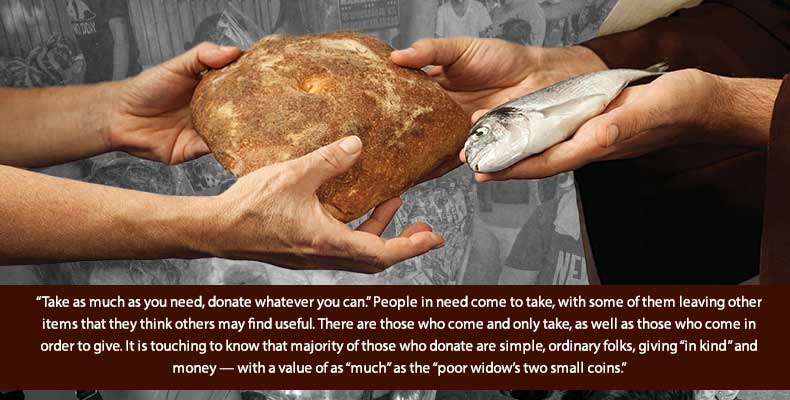Even before the pandemic started, the community pantry in many parts of the world is not a novelty. It sprouts during times of crisis, during natural or human-made catastrophes, where a good part of the population suffers for lack of necessities like food, drink and medicine.
Following our local news in the Philippines, my attention was particularly caught by a “naughty 26-year-old woman” (as she describes herself), who started a community pantry in a street called “Maginhawa.” Thanks to social media, the project went viral and in a span of two weeks, more than 800 similar pantries were put up in many parts of the country. As of this writing, the number continues to grow. In an interview, the initiator of the project said that she was struck and felt compassion for a large crowd braving the sun and rain in long queues in some cities in order to have the necessities they need, given as dole outs by the government. The sadder part is that many of those at the tail of the line — to say that these lines are normally more than a kilometer long is not an exaggeration — would end up with nothing after long hours of waiting.
“Maginhawa,” the Tagalog word for “welcoming,” is the name of the street where some residents are surviving on a daily basis by the “sweat of their brow.” With constant lockdowns and quarantines, many lost their jobs and have nowhere to go except by depending on the help of relatives, friends, persons of good will and, not always at par with people’s expectations, of the government. A prominent sign in the pantry reads: “Take as much as you need, donate whatever you can.” People in need come to take, with some of them leaving other items that they think others may find useful. There are those who come and only take, as well as those who come in order to give. It is touching to know that majority of those who donate are simple, ordinary folks, giving “in kind” and money — with a value of as “much” as the “poor widow’s two small coins.”
Various positive reactions on social media circulated from those who commented on the phenomenon: “The best coming out in a soul”; “Compassion is like a virus that could spread quickly, far and wide”; “The Good Samaritan is not dead”; “We are all brothers and sisters, we sink or swim together”; “Who will help the Filipino if not his fellow Filipinos.” Cautious comments have also sprouted: “For those in need, avoid greed”; “Beware of those taking advantage of the situation, especially the politicians”; “Covid is still around, follow health protocols”; “Where is the Government?”.
This reminds me of another crowd. That large crowd that followed Jesus in one of his public ministries, listening to his words and getting hungry at the end of the day. The disciples asked Jesus to dismiss the crowd. But Jesus, “seeing the crowd with compassion,” advised them instead: “They need not go away; you give them something to eat”. The disciples searched something from the crowd and an anonymous boy came forward and volunteered his “five loaves of barley and two fish.” From this “little” contribution, the miracle of the multiplication of the bread and fish occurred.
More than the multiplication of the loaves and fish, Jesus, on the night before he suffered and died, gave us his body and blood, in the form of bread and wine. Participants ourselves in the double-table of the Word and the Eucharist, the Lord in turn invites us “to do the same,” not only “that we may live,” but that “others may live as well.”
In our communities, where food and drinks are not lacking, there should be more than simply sharing “bread and butter” among us. We need to constantly pass around the “food and drink” that could inspire the soul and give hope to the drooping spirit. The contribution of our own “five loaves of barley and two fish” can be in the form of a little respect, a little kindness, deeper trust and sensitivity to a “saint next door”; a little collaboration in simple chores that make our community life happy and peaceful; extra patience, frequent forgiveness, more fraternal love.
May our “loaves and fish” be shared magnanimously but anonymously like those coming from the boy in the crowd. To be that person “hidden” “in the crowd,” who is just “one among us”: no position, no title, no qualification but just wanting to be a compassionate neighbor, living the spirit of “social friendship,” while navigating in the same boat, with different responsibilities but within the same tempest.
The Blessed Virgin Mary of the Holy Rosary, who generated and gave us the Truth, Jesus our Way to the fullness of Life, inspire us and may her word of wisdom be heard and acted upon promptly and joyfully: “Do whatever he tells you.”



